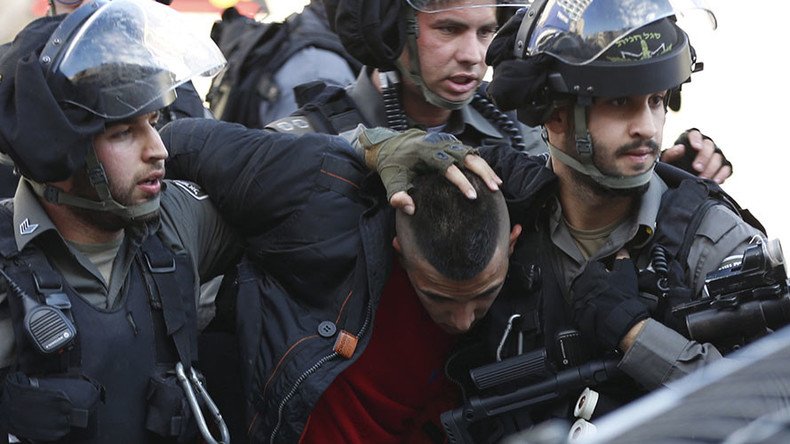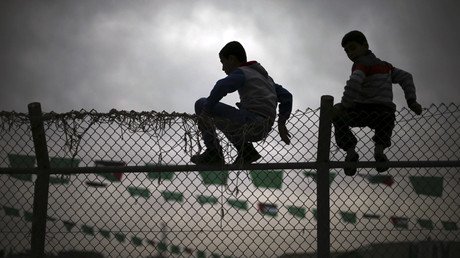HRW laments Israel ‘beating’ & ‘threatening’ Palestinian kids in detention

Tactics used by the Israeli security forces to detain Palestinian children are coming under fire, with Human Rights Watch saying the youngsters are subject to “beatings” and “treated in ways that would terrify and traumatize an adult.”
The report accuses the Israeli authorities of numerous abuses of their powers. Not only are they being accused of physically abusing minors, but also of routinely interrogating children without a parent or guardian present. This is in breach of both Israeli and international law, which entitle children to extra protection.
Quote of the Day by @saribashihttps://t.co/WlUvy2edZh#Israel#Palestinepic.twitter.com/mJwRvwbIEf
— Human Rights Watch (@hrw) April 11, 2016
Human Rights Watch’s Israel and Palestine director, Sari Bashi, spoke to RT and recalled an instance of police brutality against 15-year-old Fayez B. who was arrested in Hebron.
“In one of the cases, the child’s arrest was actually documented on video and seven very large police officers dressed in full riot gear are seen slapping, dragging and putting him into a chokehold – a child that weighs 53kg,” she said.
Israel needs to do more
However, despite the incident being filmed on camera and numerous witness statements being given, no action was taken to punish the security personnel at fault. Bashi added that Israel needs to do more to protect children who have been taken into custody.
“Israel has specially-trained youth investigators, but they are not the ones that tend to perpetrate the abuse. The abuse tends to be from ordinary police officers or soldiers,” she told RT. “They need to be much better trained, but most importantly, there needs to be a message at the highest level that Palestinian children are children. Even if they are suspected of attacks, they are children and they need to be protected.”
Israel is the only country in the world that systematically prosecutes up to 700 children in military court each yr. pic.twitter.com/7pUiIJQ1n7
— Lana (@lana_palestine) April 8, 2016
In the report by Human Rights Watch, Bashi says that the way Palestinian children are treated would “terrify and traumatize an adult.” She also accuses the police of “beatings” and “threats” towards children in order to get accurate information from them.
The Israeli police said they rejected Human Rights Watch’s findings and said the detention of youngsters was being carried out in a lawful manner. The police released a statement saying that their personnel always make sure the rights of suspects are upheld.
“It should be emphasized that Israeli police officers act in accordance to Israeli law… that includes upholding the rights of suspects wherever they are and without prejudice.”
‘They turned up uninvited’
RT’s Paula Slier looked at another method of detention carried out by the Israeli security forces, which is no less harrowing for its recipients. Slier spoke to Saleh Ghaith, who experienced a number of Israeli security personnel turning up his front door uninvited at the dead of night. They were looking for his 16-year-old son, Mohammed.
“The Israeli Army knocked hard at the door. They entered the house and said ‘where is Mohammed?’ They turned the house inside out – the chairs, the sofas, the drawers – they broke the glass. They entered the bedrooms, the kitchen and Mohammed’s bedroom,” Ghaith, who lives in Hebron, told RT.
Mohammed was alleged to have thrown stones at Israeli security forces following a disturbance. He spent three months in prison, but was released due to a lack of evidence. However, rather than arresting him at the scene of the crime, the police decided to detain him away from prying eyes at the dead of night.
“They gathered all of my little brothers and sisters in the living room. They entered my room and pulled me off the bed by my shirt while I was sleeping. My head hit the cupboard,” Mohammed recalled.
No place for non-Jews in #Israel, they should be sent to Saudi Arabia – Chief Rabbi https://t.co/tbe3USgximpic.twitter.com/IviaY7jaMK
— RT (@RT_com) March 29, 2016
Sahar Francis from Addameer Prisoner Support Association explained to RT that this is a deliberate tactic carried out by the Israeli security forces to try and bring as little attention to their actions as is possible.
“They do it on purpose to come at night and harass [them] because it is a punishment for the whole family and not just the kid. This is how they arrest both adults and children actually, by terrifying the whole family,” she said.
“They enter the houses and they intentionally break furniture or harass the whole family and they want to use this as a collective punishment against the whole family,” Francis added.
Pre-teens behind bars?
In March, the Israeli Justice Minister Ayelet Shaked said she wants to introduce a bill to punish terrorists under the age of 14, which would also see them serve jail time. The move comes after two Palestinians aged 12 and 13 stabbed a railway worker in Jerusalem in November.
If the legislation is passed, the courts would be able to sentence children under the age of 14 to prison sentences if they are convicted of murder or manslaughter. The bill has already won the approval of the Ministerial Committee for Legislation.
“Unfortunately, terrorism does not have an age, and today there are no punishments matching the cruel reality we face,” a spokesperson from Israel's Ministry of Justice told RT.
"In order to produce a deterrent and to change the reality we must make some required changes," the spokesman continued. He added that the bill “gives minors the special protection they need, while giving a serious response to terrorists who think that the courts and justice will not reach them.”
Knesset member Anat Berko from the Likud party was also supportive of the move. Berko, who has a PhD in criminology and in February reasoned that the idea of Palestinian statehood is questionable because Arabic does not contain the letter ‘P’, tried to pass similar legislation last year.
“My research shows clearly that the central motive for acts of terrorism by minors is that they are prompted to do so by older people, who tell them Israel won’t put them in jail and will send them home in a short time,” she said, according to the Jerusalem Post.













